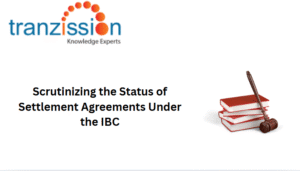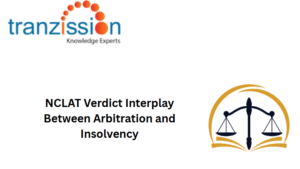
The Arbitration and Conciliation Act, 1996

Table of Contents
The Arbitration and Conciliation Act, 1996 (hereon forward known as “the Act”) governs both domestic and international arbitration, including the enforcement of foreign arbitral awards. It is essentially a legal framework for resolving disputes outside of traditional court systems through a process where parties mutually agree to appoint an arbitrator to make a binding decision on their dispute. This Act is also important for insolvents, which ensures arbitration proceedings remain fair and unbiased, even when one party is unable to pay its debts.
Overview of the Arbitration and Conciliation Act, 1996
The Arbitration and Conciliation Act, of 1996 establishes rules for arbitration and conciliation, providing a mechanism for resolving disputes outside of court:
Objective of the Act:
The Act consolidates and amends laws relating to domestic and international arbitration and conciliation. The Act aims to provide a fair, efficient, and cost-effective method for dispute resolution. It encourages parties to resolve disputes amicably without resorting to litigation.
Key Features of the Act:
The provisions of this Act, aim to reduce the role of the court in the arbitration process. It recognizes arbitration agreements and provides a statutory framework for enforcing them. It provides a process for appointing arbitrators, including when parties cannot agree on a choice. This Act incorporates both domestic and international arbitration provisions, giving recognition to enforce foreign arbitral awards under the New York Convention and Geneva Convention.
Structure of the Arbitration and Conciliation Act, 1996
The Act is structured into four parts: Part I covers domestic arbitration, Part II deals with the enforcement of foreign awards, Part III focuses on conciliation, and Part IV contains supplementary provisions:
Part I – Arbitration:
Sections 2-43 apply to domestic arbitration cases where the place of arbitration is within India. An arbitration agreement is an agreement between parties to submit their disputes to arbitration for all or some disputes between parties., as in section 7 of the Act. The Court can also refer these disputes to arbitration if an arbitration agreement. This Part also specifies grounds for challenging arbitral awards, such as public violation, and lack of jurisdiction. An arbitral award can be enforced in the same way as a court decree.
Part II – Enforcement of Foreign Awards:
This Part outlines the process for enforcing arbitral awards made in foreign jurisdictions within India. Part II covers sections 44-60, primarily focusing on awards in India governed by the New York Convention and the Geneva Convention.
Part III – Conciliation:
Part III, in sections 61-81, deals with the legal framework for conciliation, a process where the neutral third party, the conciliator, assists disputing parties in reaching a mutually agreeable settlement without imposing a binding decision. It aims to facilitate an amicable resolution of their disputes, outlining the rules and procedures related to conciliation proceedings.
Part IV – Supplementary Provisions:
Sections 82-86 under Part IV of the Act contain miscellaneous and supplementary provisions related to the Act. It covers the extent of judicial intervention in matters governed by the Act. It states that judicial authorities can only intervene in these matters if the Act specifically provides for it.
Key Provisions and Their Practical Implications
Arbitration Agreement:
Section 7 of the Act defines an arbitration agreement as a written agreement between parties to submit any existing or future disputes arising between them to arbitration. It can be included as a clause within a contract or exist as a separate agreement. If the arbitration agreement is not properly drafted and the scope of the disputes that can be referred to arbitration can lead to further litigation and delay the overall process.
Appointment of Arbitrators:
The procedure for appointing arbitrators is given under section 11. Parties are free to agree on the number and method of appointment of arbitrators. If parties cannot agree on the appointment process themselves, the courts can intervene and designate arbitrators if necessary. The lack of a clear time limit for applying to appoint an arbitrator can lead to delays and uncertainty in initiating arbitration proceedings.
Challenge to Arbitral Awards:
Section 34 of the Act outlines the legal provisions under which a party can approach a court to set aside an arbitral award. It specifies the limited grounds on which a court can overturn an arbitration decision, allowing challenges only if certain conditions related to procedural irregularities or fundamental policy violations are met.
Enforcement of Foreign Awards:
Part II, dealing with the enforcement of foreign awards, allows them to be recognized and enforced within Indian courts if certain conditions are met in international conventions, like the New York Convention on the Recognition and Enforcement of Foreign Arbitral Awards. Potential issues of this Part include the appointment of arbitrators, concerns about the impartiality and independence of arbitrators, the potential for court interference, lack of clarity in procedural aspects, and difficulties in enforcing awards against parties who may not comply with the arbitration agreement.
Judicial Interpretations and Landmark Cases
The decision of the Supreme Court in Bharat Aluminium Co. v. Kaiser Aluminium Technical Services changed how arbitration law is interpreted in India. This case clarified the applicability of Part I of the Act to domestic arbitration and excluded foreign arbitration from its scope. The court ruled that the terms ‘place’ or ‘venue’ of arbitration are synonymous with the ‘seat’ of arbitration. Regarding section 34 of the Act, in Oil & Natural Gas Corporation v. Saw Pipes Ltd., the Supreme Court interpreted the term ‘public policy’ as a ground for challenging arbitral awards. The Supreme Court emphasised upholding arbitration agreements and restricting court intervention in arbitration proceedings in Vidya Drolia v. Durga Trading Corporation.
Challenges in Implementing the Act
Judicial Delays:
The lack of clarifying the time limits in the Act and excessive court intervention in arbitration proceedings delay the judicial process. The practical implications of appointing an arbitrator, and deciding a jurisdiction, can also delay the process.
Lack of Institutional Arbitration:
In India, ‘ad hoc arbitration’ remains the dominant form of dispute resolution, where parties choose to settle disputes through self-managed arbitration processes. The lack of institutionalised arbitration means that such cases do not have procedural guidance, and parties may have potential difficulties in enforcing awards.
Enforcement Issues:
A major challenge in enforcing foreign arbitral awards arises from the potential for conflicting interpretations of public policy across different jurisdictions. The court in an enforcing country may refuse to uphold an award if it deems it contrary to its fundamental legal principles.
Awareness and Accessibility:
Small businesses and individuals often are not aware of the benefits of arbitration and conciliation and opt for litigation proceedings.
Recommendations for Strengthening Arbitration and Conciliation in India
It is recommended to encourage the use of institutional arbitration centers like the Mumbai Centre for International Arbitration (MCIA) and the Delhi International Arbitration Centre (DIAC).
To reduce court intervention, it is suggested to implement t legislative and judicial measures in arbitration proceedings.
It is recommended to align the Act with global arbitration standards to attract more international commercial disputes to India.
There needs to training programmes to develop skilled arbitrators and conciliators.
Comparative Analysis: India vs. Global Arbitration Frameworks
The Federal Arbitration Act in the United States applies to all contracts, except for contracts involving seamen, railroad employees, and other workers involved in interstate or foreign commerce. It requires courts to treat arbitration agreements on the same level as other contracts, making them ‘valid, irrevocable, and enforceable’. The US approach focuses on limited court intervention and enforcement mechanisms. The United Kingdom Arbitration Act provides a framework in England, Wales, and Northern Ireland. It ensures efficiency and flexibility in arbitration proceedings, providing a fair and inexpensive alternative to litigation.
Relevance of the Act for Insolvency Professionals
Resolving Insolvency-Related Disputes:
The Act can complement the Insolvency and Bankruptcy Code, 2016 (IBC) in resolving disputes arising during insolvency proceedings, particularly when creditors need to enforce their claims against an insolvent company through arbitration.
Enforcing Settlement Agreements:
Conciliators or arbitrators can facilitate negotiated settlements in insolvency proceedings.
Cross-Border Insolvency:
The IBC does not have a well-structured framework for cross-border insolvency cases. Arbitration can address disputes arising in cross-border insolvency cases.
Suggested Reading : Limiting the Jurisdiction of NCLT under Section 60(5)
The Way Forward for Arbitration and Conciliation in India
To further enhance arbitration and conciliation in India, the way forward should focus on promoting institutionalised arbitration, improving arbitrator selector processes, and streamlining procedures. There needs to be legal reforms that actively address judicial interference. To ensure that the Act remains effective in addressing the evolving needs of domestic and international arbitration, the legal framework needs to be consistently updated to align with international standards.
Suggested Reading : Constitution of Committee of Creditors under Section 21 of IBC
Conclusion
The Arbitration and Conciliation Act, of 1996 is an effective framework for resolving disputes, without resorting to lengthy litigation proceedings. It is largely based on the UNCITRAL Model law, meaning that it provides a comprehensive system of domestic and international commercial arbitration, including the enforcement of foreign arbitral awards. Courts refrain from interfering in the arbitration process unless there are specific grounds to challenge the award, such as those listed in section 34 of the Act.





